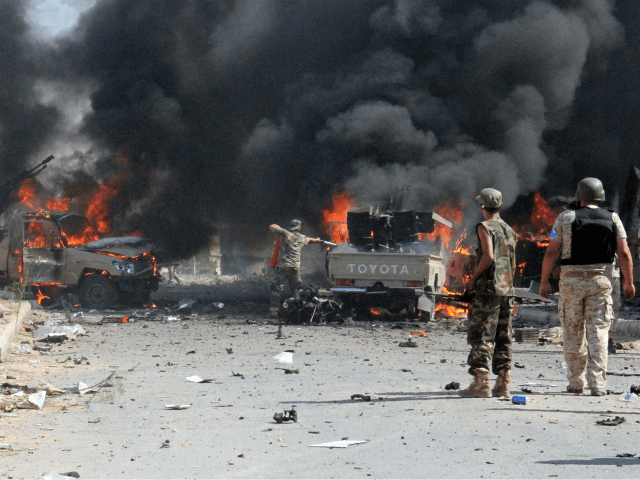WASHINGTON, DC — Russia, the Islamic State (ISIS/ISIL), and other jihadis are expected to benefit from the chaotic conditions in Libya fueled by Moscow-backed renegade Gen. Khalifa Haftar’s ongoing offensive to take the capital of Tripoli from the internationally-recognized government, experts said Wednesday.
Propped up by Russia, France, Egypt, Saudi Arabia, and the United Arab Emirates (UAE), Haftar and his Libyan National Army (LNA) fighting on behalf of the breakaway government in eastern Libya’s Tobruk region have conquered most of the North African country, to the detriment of the United Nations-brokered Government of National Accord (GNA).
Haftar’s supporters believe he can defeat the jihadi groups operating in Libya and restore stability to the oil-rich North African nation.
The warlord has set his eyes on Tripoli, home to GNA headquarters. On April 4, Haftar and his LNA launched an offensive to take the Libyan capital that has already left more than 400 dead, over 2,000 wounded, and displaced nearly 70,000 people.
On Wednesday, several experts testified about the ongoing conflict in Libya before the House Foreign Affairs Subcommittee on North Africa and International Terrorism. Most of them warned lawmakers that ISIS and Russia would likely capitalize from a prolonged Tripoli offensive.
In his written testimony, Ben Fishman from the Washington Institute for Near East Policy declared:
If the current crisis persists, one can easily envision a prolonged Libyan civil war leaving space for ISIS and other extremists to thrive and/or Russia to exploit the situation to establish a base on NATO’s southern flank. Such an outcome would leave the United States in a much worse strategic position [in] the Middle East, North Africa, and [the] Mediterranean.
The U.S. military has repeatedly cautioned against Moscow’s footprint in Libya.
Thomas Hill from the United States Institute of Peace noted that Russia has already established at least two operating bases in Libya.
Hill explained via written testimony:
The Wagner Group, Russian mercenaries supported by Russian military intelligence, have been operating inside Libya for several years, including sending a reported 300 soldiers into Benghazi to support the LNA. Russia has reportedly also established at least two forward operating bases inside Libya.
Frederic Wehrey from the Carnegie Endowment for International Peace agreed with Fishman that Gen. Haftar’s operation had created a political and security vacuum that will likely benefit ISIS.
The Carnegie expert pointed out that there has been a spike in ISIS-linked activity since the Tripoli Offensive began, adding that there could be a “further escalation” as the operation intensifies.
Wehrey noted in his prepared testimony:
The Islamic State will try to exploit the political and security vacuum created by Haftar’s attack. After the 2016 Sirte campaign, the terrorist group has been confined to mobile desert bands and urban cells. …Since the current clashes started, there has been a noticeable uptick [in ISIS activity], especially in Libya’s desert south. We can expect a further escalation as Libyan militias on both sides of this war that were previously deployed to contain the Islamic State are now focused on fighting one another.
Haftar has accused the GNA of working with ISIS and other jihadis.
“ISIS and other violent extremist organizations will continue to exploit Libya’s lawlessness and insecurity,” Megan Doherty, the senior director for policy and advocacy at Mercy Corps, told lawmakers.
In late 2016, U.S.-backed local forces pushed ISIS out of Sirte, a coastal city located a few hundred miles from the European coast that once housed the jihadi group’s largest stronghold outside Iraq and Syria.
The experts indicated that, given Libya’s location, instability in the North African country directly threatens Europe and is likely to trigger a wave of migrants seeking to reach European shores.
Hill noted:
Absent U.S. leadership to corral the internal and external actors operating inside Libya today, it is unlikely that the current stand-off between the Field Marshal Haftar and anti-Haftar forces in Tripoli can be resolved without significant costs to the unarmed civilian population.
Such a bloodbath will create a new flood of irregular migrants into Europe and provide terrorist groups with an opportunity to exploit Libya’s ungoverned spaces.
“Terrorists will continue to exploit Libya’s porous land borders and proximity to Europe,” Doherty warned.
Echoing Doherty, Fishman noted that Libya serves as a key transit country in migration routes between Africa and Europe.
“Ongoing chaos in Libya has the potential to radiate outward to its neighbors in North Africa and Europe,” he said.
Amid the Tripoli offensive, access to food and services is shrinking and the health sector is collapsing, Doherty noted.
She said “more than 3,100 refugees and migrants” imprisoned in and around Tripoli “are at great risk of abuse, injury, and death.”
“The [Tripoli-fueled] crisis is Libya’s worst in half a decade and, potentially, since the 2011 revolution,” Wehrey declared.

COMMENTS
Please let us know if you're having issues with commenting.